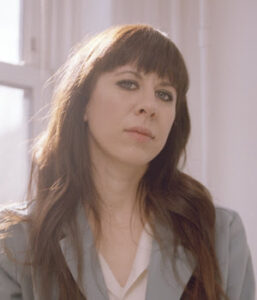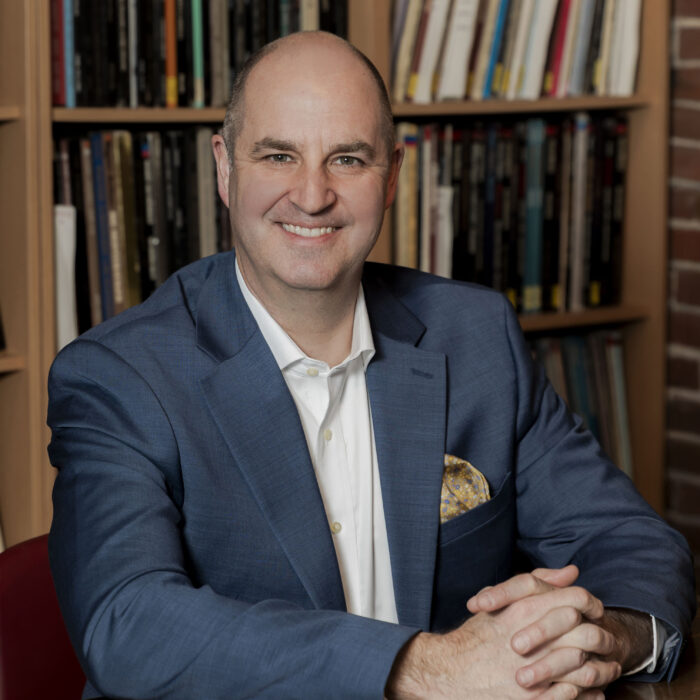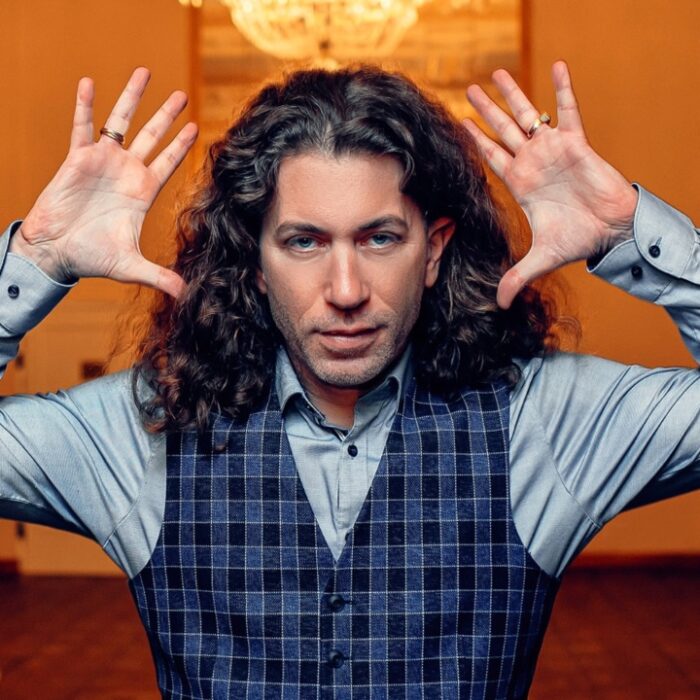
Q & A: Composer Missy Mazzoli & Author George Saunders on ‘Lincoln in the Bardo’
By Christina Waters(Photo:
Missy Mazzoli is an acclaimed composer of experimental chamber operas whose oeuvre ranges from electronic avant rock to short-form chamber operas. One of the first two women to receive a commission from the Metropolitan Opera, she joined forces with her longtime collaborator, Pulitzer Prize-winning librettist Royce Vavrek, to created the highly anticipated “Lincoln in the Bardo,” premiering at the Met in Fall 2026. Lincoln is
Mazzoli’s fifth full-length opera collaboration with Vavrek and is based on the Booker Prize-winning novel by George Saunders.
A genre-breaking supernatural tale engaging the death of Abraham Lincoln’s young son, Saunders’s 2017 best-seller traces the surreal adventures of those trapped in a twilight region Tibetan Buddhism calls the Bardo. These rambunctious spirits devise pungent methods of addressing the President’s grief and his young son’s arrival in their midst.
Inventing wordplay and literary devices to further the pranks, regrets, and mysteries involving the denizens of the Bardo, Saunders’ book provided an irresistible prompt for Mazzoli’s music. Last summer, Mazzoli’s sparkling score was performed by Chautauqua Opera Conservatory singers joined by celebrated soprano Christine Goerke, singing a role written for her.
OperaWire spoke with author George Saunders and composer Missy Mazzoli about the background to the opera “Lincoln in the Bardo.”
OperaWire: George, can you talk about your relationship with the Buddhist concept of the Bardo?
George Saunders: I am a student of Tibetan Buddhism, so I heard of and attempted to read the “Tibetan Book of the Dead.” I knew about that particular Bardo, and in my mind it was kind of a different version of the Catholic purgatory that I grew up with. That purgatory was kind of like going to the DMV and you sit there forever. But in my understanding of the transition between life and death and Buddhism is that there are actually things you can do.
You can train yourself through this life so that in that moment, you’ve got a little bit of mobility and a few options. That was exciting to me as a fiction writer because you want your character to have some choices. I originally thought, oh, I’ll just, you know, become a master of that Book of the Dead, and then I’ll set my novel in that world. But after reading a few pages I realized I don’t have that capability, so I thought I’d make up my own kind of distorted version of it.
OW: There’s a lot of surreality and absurdism and, of course, all your marvelous characters. Roger Bevins, for example, is an obvious favorite. Very Monty Pythonesque. But there’s plenty of them so that surrealism seems to be the sort of seasoning you have sprinkled throughout to mitigate some of the profound sadness of the book.
GS: Yes. One of the things I heard was, when you pass away your mind is like a wild horse that all your life, has been tethered to a pole. But then in the moment of death, the tether gets cut and the mind goes berserk. So that’s one of the ways I guess I could sort of rationalize my own natural bend towards surreality is that, yeah, when you die, it’s going to be surreal. This crazy mind without the body, oh God, the possibilities, exaggerated possibilities. If you have a neurosis here, you’re going to get the truck size version there.
OW: Why do you think “Lincoln in the Bardo” became so popular? Did it strike a nerve? Because everyone wonders what happens after death?
GS: We recently saw some excerpts of the opera-in-progress in Chautauqua. A packed house of 1400 people in a little theater. And it was really interesting to watch and to feel the reactions, very visceral. Lots of laughs, lots of kind of quiet, intense moments. So I think my intention in the book was to really appeal to my reader, on that level, like, okay, we’re in this mess together. We think we’re permanent, but we’re not. We love people, but they’re going away. So what do we do?
I think I was trying to really communicate with people on that very frank level, like, wow, we’re, you know, we’re in a beautiful mess, right? We’re like a baby in a battlefield. We don’t have the preparation we need to get through this life without a great deal of pain. I don’t know why it was so popular, but it was certainly my intention for it to be ecumenical and to be entertaining.
OW: Your text strikes me as Wagnerian in sterms of the motifs, the leitmotives that he creates. They’re much like your repeated lines, such as “you are a wave that has crashed upon the shore,” says one character, then another, then another. If I were the composer that line might have its own instrument. When I first read it, I thought the book was ripe for operatic treatment.
GS: I agree. I first had written the whole thing as a play years ago, and it didn’t quite come alive. but I was always imagining a stage. I really like that idea of an elemental visualization of what we’re looking at and then building out on that visualization. The crypt is over here, the chapel is over here. My wife and I were seeing some operas at that time in New York, and I was in love with the form. And also, I think my writing tends to be a little bit and I use this word, not in a pejorative sense, but it’s cartoonish. These aren’t fully developed Virginia Woolf kinds of characters.
OW: Missy, opera is adept at communicating many things at the same time, which makes it perfect for orchestrating the ideas in this book. When did you first meet the book?
Missy Mazzoli: I read it soon after it came out. George is one of my favorite writers, and I had read all his books of short stories. And so when his novel came out, l read it very quickly. I didn’t think of turning it into an opera at first. But then my librettist Royce Vavek said he loved George, and why don’t we adapt “Lincoln in the Bardo?” Very soon after that I got the commission from the Met, and I thought, okay, this is perfect.
There are 160 some characters in the book. There are not that many in the opera, but there are a lot. This is a story that has so many layers and requires a big stage and a lot of resources. So working at the Met you have access to more resources than you would working at most other companies. It was in roughly 2018, the timing just was great. And they really went for it, they were excited about the idea.
OW: Did you create themes for characters first and then give them more specificity? Did you have, for example, a rough idea, then some brainstorming and then the individual characters started emerging? How might that have worked for “Lincoln and the Bardo?”
MM: The libretto is done first and that is a sort of scaffolding. There’s a lot of character information, obviously, in the book to begin with, and then we sort of distill it down into a libretto. So by the time I start writing music, I really have an idea of who these characters are, how they fit into the story, and then there’s a lot of coming up with themes that give them a musical identity distinct from everyone else in the opera. So Lincoln has his own kind of music, and then the Reverend has his own kind of music. Devins does. Everyone has their own flavor. I wanted you to be able to hear the music and recognize each character’s music. It’s not quite like the Wagnerian leitmotif idea, but it’s very similar.
OW: The problem would be choosing, selecting which characters to pull out of the text, wouldn’t it?
GS: Yes, you put your finger on it. I had a funny experience when Royce first sent the libretto to me. You always kind of brace yourself, but my reaction was oh my God, it’s great. He didn’t leave anything out. And then I realized, wait a minute, it’s only 50 pages. So he did a beautiful, poetic job of selecting. My reaction was just, yeah, of course. Perfect, fabulous.
OW: You invent novel wordplay continuously in Lincoln; sick-box, man-smell, ran-skimmed. The ten false mothers that Willie Lincoln notices. The multiple Gilberts. I can see them now on stage. Were these kinds of experiments—the expansion of language, the multiplication of persons —new to this book?
GS: Well, the game was to try to find a physical, or sometimes linguistic, corollary for what ailed the characters, in other words what was keeping them in the Bardo. So with Bevins, my mental process went something like: His main trope is that he longs for the things of this world; what might his body do in response to that desire? And then the answer was to make him this sort of Shiva-like guy, with countless organs for experiencing the things of the world , if he can ever get back there.
OW: How did the opera come about? Did Missy contact you and say something like, I read your book, I love it, I want to do it as an opera?
GS: Yes, I think it was Missy who started it. I heard that she wanted to do an opera, and I knew a little of her work, and I quickly became more familiar with it. We met in New York, and we just had this beautiful breakfast. I was amazed by how beautifully she understood the book, and especially the humor she got, that this could not be a ponderous thing. And so we had a great kind of mind melt of what the opera could be. And immediately were brainstorming rather than auditioning. I told her, I know your work. I love it. Just go do what you like with this. Make a masterpiece by your own definition. So we had a beautiful first conversation, and then it just kind of kept rolling. When I got the libretto, it was like an incredible gift. And so it’s been sort of proceeding stepwise, and my contribution was to read the libretto and comment. Such as, well, I wonder if we might, you know, or is there any value in adding this? And then I just step back and let them go and go.
OW: It sounds like a very serendipitous blending of sensibilities and ideas and and you’re very generous to let Missy and Royce have the book and go with it.
GS: The joke I make is that the trick to having a good collaboration is hire geniuses at some point. I’m certainly not the person to design or to write an opera but if you pick out the right people, well, I feel at this point that we sort of are extensions of one another’s sensibility. Yes, first you get two geniuses and then you don’t have to worry or nitpick. You know, it was almost like I told Missy, that I felt hearing her music the same way I felt when I was writing the book.
MM: Royce writes libretto, and once he has a draft I’ll read it, and give feedback. And that’s a process that can sometimes take over a year where I’m just refining the text. Before I even start writing. But once I’m writing, we’re also still going back and forth, really up until the premiere, because sometimes things need to change to fit the music, or sometimes I’ve written music that really does not go with the text. So there has to be flexibility between the two of us the whole time. We’re also best friends, we met in 2009 and see each other like every day, and we live about a mile from each other, we hang out all the time, so we’re in this constant dialog about the work.
OW: And were you in agreement about how many characters would need to be created for this text?
MM: Yeah. I mean, there was a really painful process of deciding to leave out. Many sort of became composites. So there are a couple of characters that are, you know, were there aspects of a few characters, but for the most part, you know, we just had to cut a lot out. There are only about seven principal characters in the opera. But then there are a lot of moments where people step out of the chorus, sing a little part, and yeah, we’re basically mostly in agreement of who had to be there.
OW: The language that Saunders has invented for each of the different characters is so unusual, each one stretches English so beautifully. I should think that the sound architecture would be similarly eccentric for each one. And then there’s that incredible literary creation, a phenomenon actually—the matter light blooming event that takes people from the Bardo. Did you create a special soundscape for that?
MM: Yeah, there are really fun, big orchestral moments for the matter light blooming.
OW: Many young composers are busy now creating micro operas and performing them in non-traditional halls. I know this interests you.
MM: I think of opera as the ultimate immersive contemporary art form that is combining everything. So I think that anything, any opportunity to bring opera into unconventional spaces, to use electronics to tell new stories, tell contemporary stories, is really powerful. That’s always what opera has been. Opera has historically been a place to tell the stories of its moment in history. And so we really are doing the art form a disservice if we don’t see it as a contemporary art form, if it’s not alive.
OW: And you’ve done several mini operas.
MM: Yes, well I did “Salt,” an interesting project for cello, solo voice and lots of electronics. It’s a story of Lot’s wife, and it was really fun to bring that into musical storytelling, into the experimental theater world. The opera world can be so siloed, and many people think well there’s music and then there’s opera. Opera is always seen as this separate thing. But no. I came to opera through music videos, watching a lot of MTV, wanting to create work that was immersive, that kind of wrapped around you, immersed you in an evening.
And I think we should be encouraging young people to see themselves in opera and to relate to it. That’s a really big thing. I have a lot of students, and once I show them opera, and what it can be, they all want to write opera, and then they become the opera audience of the future and they start going to opera, and all of a sudden, like, Opera has new life. But if they don’t, aren’t able to see themselves in or don’t have a way in, it’s not going to happen, right? Storytelling plus music plus a voice can be an opera.
OW: Storytelling is key for you?
MM: Even in my works without vocals, I’m still telling a story. I think of all of my work as being narrative. All my work is storytelling. It’s a little more obvious in the operas, sure, but I think it’s present everywhere. I really fell in love with writing opera 10 years ago. And these things take so long to write that most of my time in the last decade has been focused on opera. But I’m still writing a lot of orchestral stuff too, and chamber works.
OW: And after “Lincoln?”
MM: I’m actually working on another opera right now that’s almost done, called “The Galloping Cure.” A work that resets a Kafka story within the opioid crisis, for a Scottish opera and a couple other companies which will actually premiere before “Lincoln.” Crazily enough, it’ll premiere in August of next year at the Edinburgh Festival.



